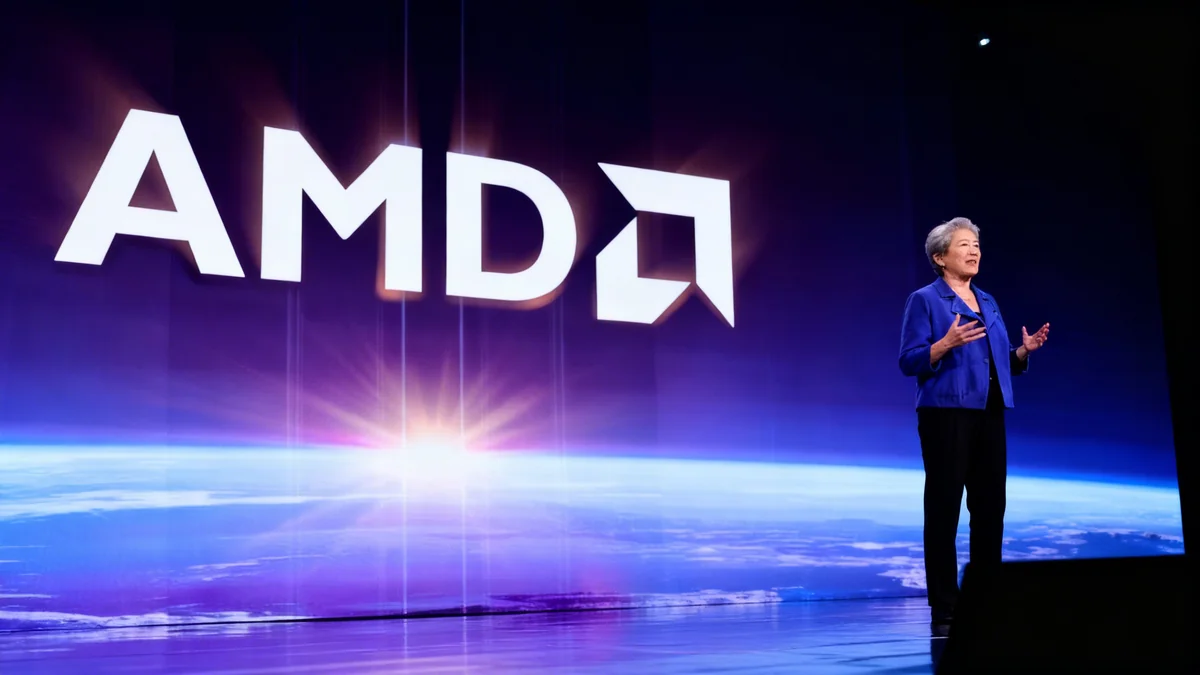OpenAI's recent agreements to purchase artificial intelligence chips from Advanced Micro Devices (AMD) and Broadcom are reshaping the semiconductor landscape. These deals have triggered significant stock market gains for both companies, signaling a growing market for AI hardware that extends beyond the current leader, Nvidia.
Key Takeaways
- OpenAI has secured chip supply agreements with both AMD and Broadcom, diversifying its hardware sources.
- Following the announcements, AMD's stock increased by over 40%, and Broadcom's saw a 10% single-day rise.
- While Nvidia still holds approximately 95% of the AI chip market, its stock has seen a slight decline as competitors gain ground.
- The immense spending on AI infrastructure by companies like OpenAI is creating opportunities for multiple chipmakers to succeed.
- Analysts note concerns regarding OpenAI's long-term financial commitments, which exceed $1 trillion through 2030, and the potential risks for its partners.
Market Reacts to New AI Chip Agreements
Recent strategic partnerships have sent ripples through the technology sector. In the two weeks following the announcement of its deal with OpenAI, AMD's stock value surged by more than 40%. The company's momentum was further bolstered by a substantial order from Oracle Corp., reinforcing investor confidence.
Broadcom experienced a similar, albeit more immediate, positive outcome. After revealing its own agreement with OpenAI, Broadcom's shares climbed 10% in a single trading session, marking its strongest performance since April. In contrast, Nvidia's stock experienced a 3.5% decrease during the same period, underperforming the tech-focused Nasdaq 100 Index.
The Need for Diversification
The massive computational power required to train and operate advanced AI models, such as those developed by OpenAI, necessitates a vast and reliable supply of specialized chips. Relying on a single supplier presents significant risks, prompting companies to seek multiple hardware partners to ensure stability and foster competition.
Eric Clark, a portfolio manager at the Rational Dynamic Brands Fund, highlighted the strategic imperative for OpenAI. "OpenAI clearly can’t rely just on Nvidia," he stated. "They have to do deals with as many people as they can because they have a voracious appetite for computing power."
Nvidia's Dominance and the Expanding Market
Despite the recent gains by competitors, Nvidia's position in the AI infrastructure market remains formidable. According to data from Bloomberg Intelligence, the company commands an estimated 95% of the total market share. Its hardware has become the industry standard for developing and deploying complex AI systems.
However, the sheer scale and rapid growth of the AI industry are creating a market large enough to support multiple major players. As billions of dollars are invested in AI infrastructure, companies like AMD and Broadcom are capturing a growing portion of this expenditure. Investors are increasingly recognizing these emerging opportunities.
"Nvidia remains at the hub of the AI ecosystem, everyone else is playing catchup. But that doesn’t mean it is the only company worth investing in." - Kevin Mahn, President and CIO at Hennion & Walsh Asset Management
OpenAI's Influence in the Tech Sector
With its aggressive spending and high-profile partnerships, OpenAI is becoming a major influencer in the technology supply chain. The company's decisions on which hardware to procure can significantly impact the financial performance and market standing of chipmakers. This has been described as making the ChatGPT operator a new "kingmaker" in the industry.
The deal with AMD, in particular, was seen as a crucial milestone. "The industry really wants a substantive alternative to Nvidia, and it seems like AMD has arrived," said Jason Tauber, co-manager of the Neuberger Berman Disrupters ETF. He referred to the OpenAI agreement as "important validation that this is real."
The AI Arms Race
The technology industry is currently engaged in what many describe as an AI arms race. Companies across various sectors are investing billions to build out the necessary infrastructure, fearing they will fall behind competitors if they fail to adopt the technology. This massive capital expenditure is the primary driver behind the booming demand for AI chips.
Financial Questions and Future Outlook
While the surge in spending benefits chip manufacturers, it also raises questions about the sustainability of the current AI investment boom. A significant point of concern is the financial structure of OpenAI itself. As a privately held company, it is not required to disclose its financial health through quarterly reports, creating a lack of transparency for its partners and the market.
Reports indicate that OpenAI has made financial commitments exceeding $1 trillion through 2030. This has led some analysts to express caution about the company's ability to meet these extensive obligations over the long term.
Michael O’Rourke, Chief Market Strategist at Jonestrading, advised a skeptical approach. "Everyone should remain highly skeptical about whether OpenAI can deliver on the extraordinary obligations it has taken on," he wrote in a client note. O'Rourke warned that if problems arise, the repercussions would be felt by all companies with significant exposure to OpenAI.
Investment Opportunities Beyond a Single Stock
Despite the potential risks, the current environment presents new opportunities for investors. The emergence of strong competitors to Nvidia allows for greater diversification within the semiconductor sector. Instead of concentrating investments in a single dominant company, investors can now spread their capital across several firms poised to benefit from the AI revolution.
- AMD: Gaining traction with major cloud providers and AI developers.
- Broadcom: Leveraging its expertise in custom chip design for major tech clients.
- Nvidia: Continuing to lead the market with its established ecosystem and powerful GPUs.
This increased competition is viewed as a healthy development for the market. "The sense of competition and other companies winning deals is very much welcome," said Kevin Mahn of Hennion & Walsh. "Investors now have more opportunity to not be concentrated in any single name. They can diversify into other chipmakers."





